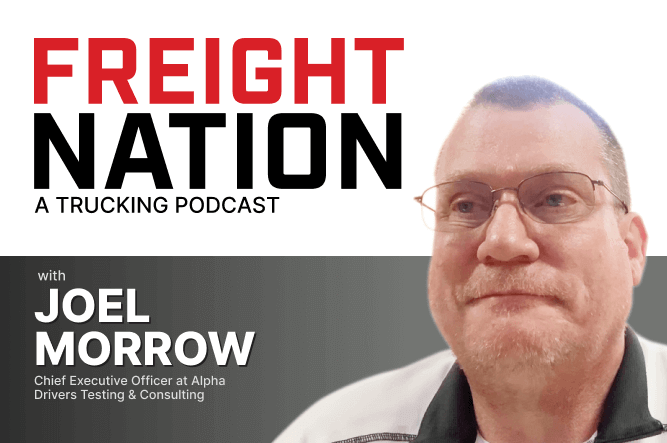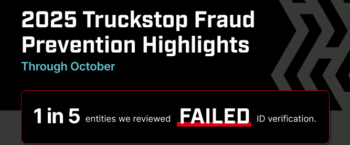Podcast: Joel Morrow on Rethinking Trucking Standards

Listen up!
Check out our trucking podcast, Freight Nation.
Continuous innovation is necessary for survival and efficiency in an industry as dynamic as trucking. Just ask this veteran trucker, who has over 30 years of experience, a career marked by over 4 million miles, and multiple awards, such as the Top 50 Green Fleet award and the 2018 HDTX Innovators Award.
Joel Morrow, CEO of Alpha Drivers Testing & Consulting, joins the latest episode of Freight Nation: A Trucking Podcast to share his wealth of knowledge and experience that might reshape the entire trucking industry.
A Fair Pay Model
One of Joel’s most passionate arguments is about the outdated pay structures in trucking. Traditionally, drivers have been compensated per mile, a method that undervalues their time and compromises safety.
“There has to be a time value attached to wages…When it comes to wages and earnings in the trucking industry, for so long, we’ve been paid by the mile. And we give away a lot of time at loading docks when we’re paid by the mile. You’re forced to take risks and chances that you normally wouldn’t because you want to preserve a paycheck.”
As a result, Joel came up with his own hybrid model that values both the miles driven and the time spent behind the wheels. This ensures drivers are fairly compensated for all their time on the job, including delays and waiting times at docks, while encouraging safer driving habits.
From 6×4 to 6×2
Moving beyond compensation, Joel also touches on technical innovation that could lead to better fuel efficiency and overall operational improvements. Specifically, he points to the benefits of the 6×2 axle configurations over the more traditional 6×4 setup.
“We have to think with a different mindset. I like to say we have a 6×4 mindset in the United States because that is the predominant axle configuration, where we have two powered axles on the back and a power divider, which everybody’s familiar with. It is not the most efficient, and it’s not even the best for traction. When you have a correctly configured weight biasing 6×2, you can have better attractive potential on the highway than a 6×4.”
By reducing the number of powered axles from two to one, the 6×2 configuration saves fuel and improves both traction and vehicle handling.
Gross Versus Net Earnings
One of the most important lessons in the trucking industry is to distinguish between gross and net, both in terms of financial and operational efficiency.
At the same time, when it comes to fuel efficiency and business profitability, most focus on gross earnings. However, Joel stresses the importance of focusing on net profits to truly understand business success. Net earnings represent the actual take-home income after expenses.
One way to improve net earnings is by achieving greater fuel efficiency. Even in challenging terrains such as the Pacific Northwest and Appalachia, achieving over 10 miles per gallon can enormously boost the bottom line, reducing fuel and maintenance costs.
“Very early on, I learned the difference between gross and net, not only in finance terms but in terms of speed management in terms of time management. And these are terms that we struggle with in the industry as far as owner-operators and small fleets, everybody likes to look at their gross. Very few people actually know their net and that applies both financially and operationally.”
From driver pay to truck construction and operation, embracing alternative compensation models and technological innovations allows the trucking industry to move towards a more sustainable and profitable future.
To learn more about efficiency and time value in the trucking industry, tune into this episode of Freight Nation: A Trucking Podcast on Apple, Spotify, or your favorite podcast platform.
Get helpful content delivered to your inbox.
Sign up today.
Find high-quality loads fast, get higher rates on every haul, and access tools that make your job easier at every turn.






